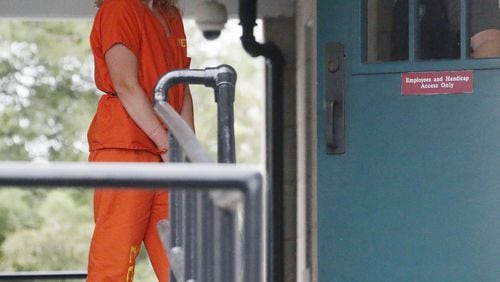A top federal prosecutor offered a prediction — and a warning — on Thursday after Reality Winner was sentenced to a record-setting 63 months in prison for leaking top-secret government records about Russian meddling in the 2016 election.
“Winner will serve a term of incarceration that will give pause to others who are entrusted with our country’s sensitive national security information and would consider compromising it,” said Bobby Christine, the U.S. attorney for the Southern District of Georgia. “Anyone else who may think of committing such an egregious and damaging wrong should think both of the prison sentence imposed today and the very real damage done.”
RELATED: Reality Winner pleads guilty in NSA leak case
Not everyone agrees how the Trump administration’s anti-leak campaign will turn out.
“People are going to continue to blow the whistle on fraud, waste, abuse and illegality because they violate the law,” predicted Jesselyn Radack, a former U.S. Justice Department official who came under criminal investigation after exposing violations in the government’s handling of the case of “American Taliban” John Walker Lindh.
One of Winner’s attorneys, Titus Nichols, offered a different view about how would-be leakers will react.
“I have not seen it be a deterrent for defendant B, C, D or E,” he said, speaking generally about criminal cases. “Murder is illegal, but it has not stopped other people from committing that same horrible offense.”
In contrast, Thomas Drake – a former National Security Agency official who leaked information about wasteful government spending – said Winner’s sentence could send a chill up the spines of wannabe whistleblowers.
“It’s quite harsh,” Drake said of Winner’s sentence. “I wasn’t surprised at all. It has upped the ante.”
The government prosecuted Winner, a former U.S. Air Force linguist, under the Espionage Act, a World War I-era law aimed at spies. Shackled at her ankles and wearing a bright orange jail uniform, Winner, 26, smiled subtly as she saw her parents in the courtroom. When it was finally her time to speak, she read from a written statement, expressing contrition and holding her hands behind her back.
“I sincerely apologize and take full responsibility for my actions,” the former NSA contractor told Chief U.S. District Court Judge J. Randal Hall in a federal court in Augusta. “In particular, I want to apologize to my family.”
Winner asked to be detained at the Federal Medical Center Carswell near Fort Worth, Texas, saying that would place her nearer to her family in Kingsville, Texas, and allow her to get treatment for her bulimia, an eating disorder. She has already spent more than a year at the Lincoln County Jail outside Augusta and will get credit for that time as part of her sentence.
Winner faced up to 10 years; a plea deal with prosecutors called for her to serve five years and three months. That is longer than anyone else has been sentenced for an “unauthorized disclosure to the media,” according to federal prosecutors. They and Winner’s attorneys urged Hall to agree to the sentence spelled out in her plea deal, saying it would be adequate. The prosecutors added that avoiding a trial would prevent them from having to reveal classified information in court.
“This sentence by the court reflects the seriousness of the crime,” Hall said after announcing her punishment, adding it would serve as a deterrent by promoting “respect for the law.”
Prosecutors say Winners mailed a copy of a NSA document to The Intercept, an online publication. The Intercept published an article based on the report, saying Russian military intelligence sent spear-phishing emails to more than 100 local election officials and launched a cyber attack against a Florida-based voting software supplier that contracts in eight states.
Christine, the federal prosecutor, told reporters after Winner’s hearing that the government had determined her actions “caused exceptionally grave damage to U.S. national security.”
“That harm,” he said, “included but was not limited to impairing the ability of the United States to acquire foreign intelligence information similar to the information disclosed.”
“Make no mistake, this was not a victimless crime,” he said. “Winner’s purposeful violation put our nation’s security at risk, not in a speculative way or hypothetical way but in a very real way, a very direct way.”
The Press Freedom Defense Fund, which provides legal support to journalists and whistleblowers and is part of The Intercept’s parent company, called Winner’s sentence “completely unjust.”
“Demonstrating her passion for her country, she heroically — at great personal risk — alerted fellow Americans to vital information that Russia had tampered with the 2016 U.S. elections,” said the fund. “Her selfless act makes her a true patriot, not a criminal.”







